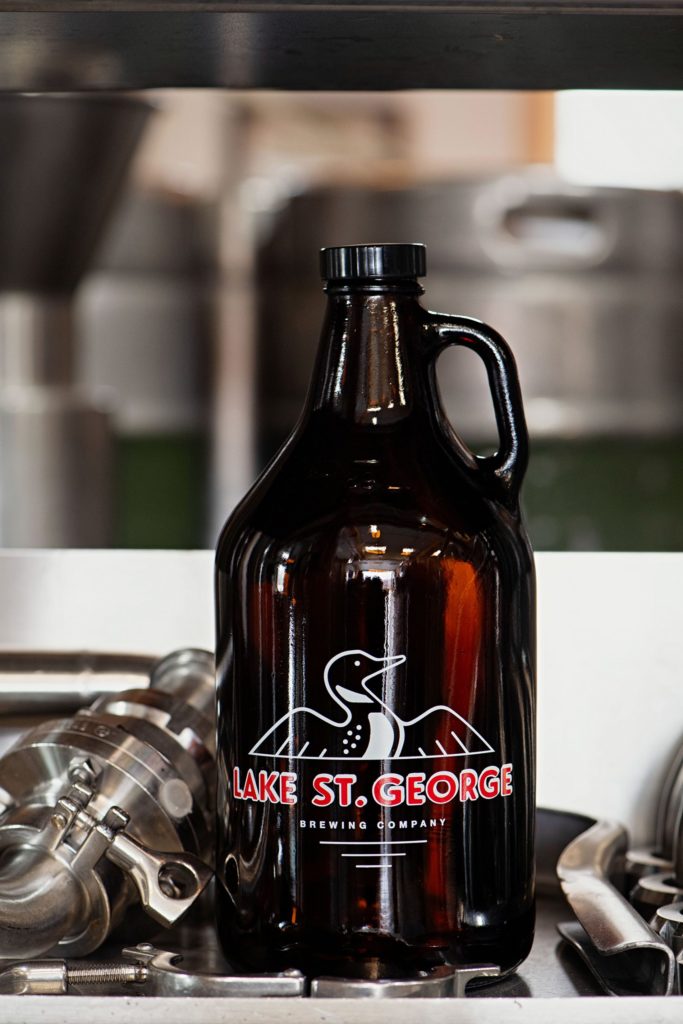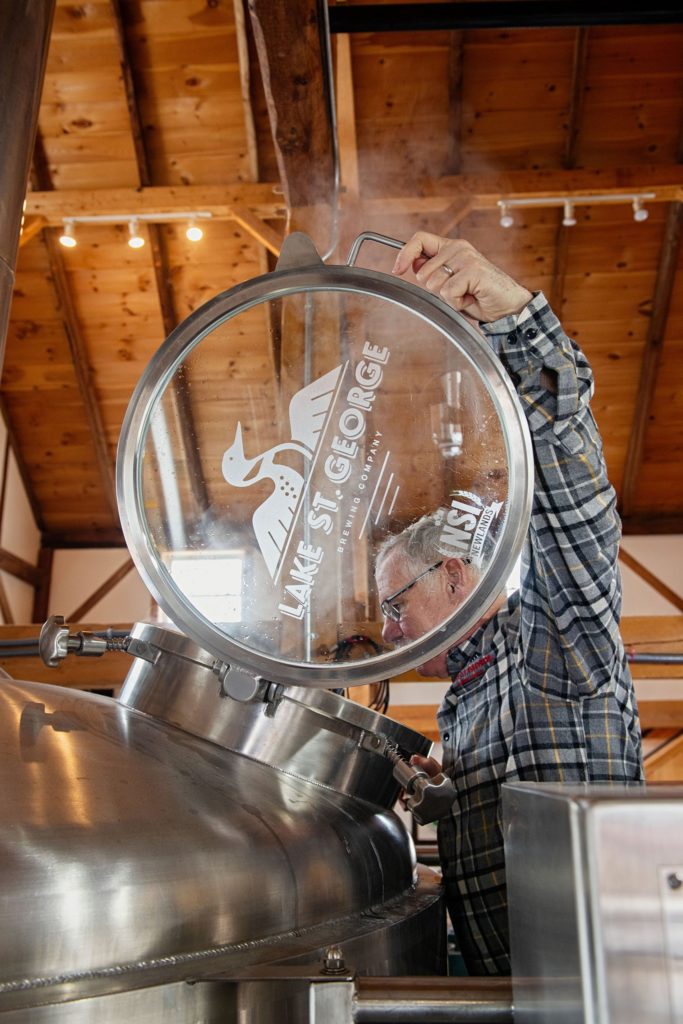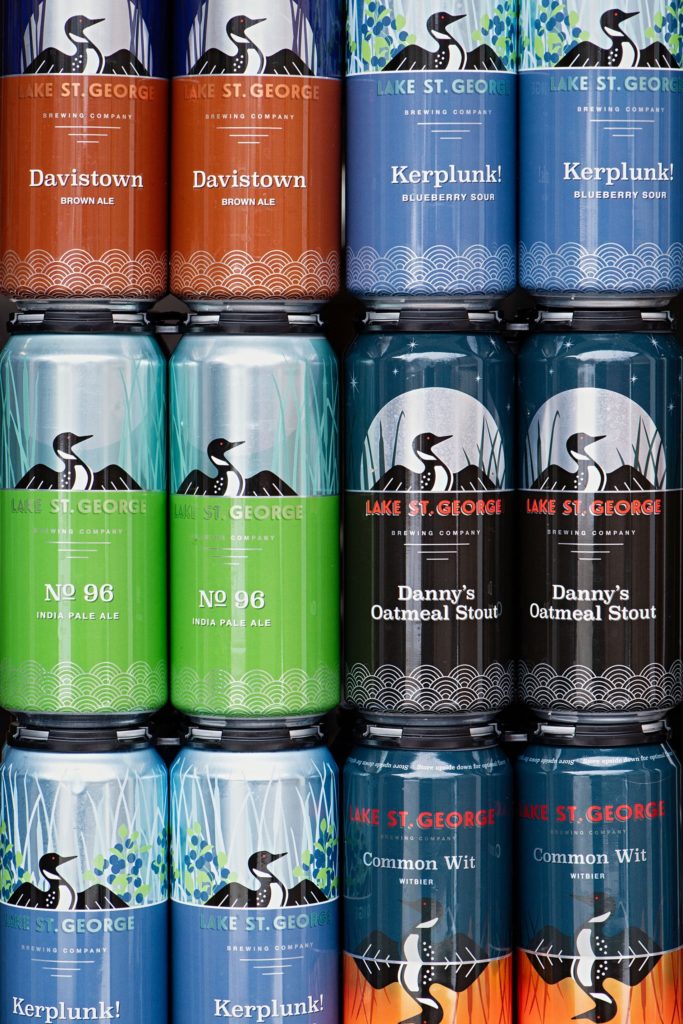The Godfather of Maine Craft Beer
Head brewer five times over, Danny McGovern continues his legacy at Lake St. George Brewing.

After a slow sip from his pint of Davistown Brown Ale and a scan over the outdoor patio at Lake St. George Brewing, where a dozen patrons have bucked the cold and the pandemic to drink his beer, Danny McGovern sets his boyish blue eyes on me. “So,” he says, “what do you want to talk about?”
When you’re tête-à-tête with Danny McGovern—the storied head brewer for five Maine breweries and a founder of the state’s craft beer revolution—that’s a loaded question. There are over 50 years of brewing knowledge roiling behind those eyes. I take a drink of my Pinnacle Double IPA and consider his question as the rich malt and mango notes finish on my palate. “Let’s go back to the start,” I finally say.
McGovern is a Hoosier by birth. When he was a kid in Terre Haute, his uncle Max brought homebrewed beer to family parties. “Everybody drank beer in my family—everybody,” he recalls. So in 1967, when he took an interest in brewing, his parents encouraged their teenaged son to boil a batch of beer on the kitchen stove. He laughs as he remembers this story, explaining that you probably couldn’t let your high school kid do that today. Not only were his parents lax in allowing their teenager to brew beer, they were also permitting him to break the law. Homebrewing in America was illegal until Jimmy Carter signed what was known as the Cranston Act in 1978. Clearly there’s something to be said for laissez-faire parenting.
In high school McGovern met Carol Snow, a girl with deep Maine roots. After eventually marrying, the couple moved to Liberty, trading the Midwest for the midcoast. During the ’70s and into the ’80s, he continued to homebrew as a hobby, purchasing ingredients from the few catalogs that existed for homebrewers back then.
“I can still remember the first time I read the word microbrewery,” he says. A playful grin works over his face now, as if the word still holds the original magic it conjured nearly four decades ago. In 1992, as then-microbreweries like Sierra Nevada, Sam Adams, and Maine’s own D.L. Geary Brewing Company were starting to take hold of the national palate, McGovern decided to make the jump into commercial brewing by opening the first incarnation of Lake St. George Brewing Company, in his home in Liberty. He built an addition onto his house and installed a seven-barrel system, brewing roughly 1,700 barrels of beer a year to keg and self-distribute around the state.
Elizabeth Johnston, McGovern’s daughter and a co-owner/ brewer at the current iteration of Lake St. George Brewing, remembers the effort it took for her father to track down brewing equipment in the early ’90s. “Some of the equipment was converted dairy tanks sourced from Canada. In typical Dan style, once when they picked up a load of equipment there was no passenger space, so he rode home inside the mash tun,” she says.

McGovern’s eldest daughter, Mary Weber, a co-owner and brewer at the island-based Monhegan Brewing Company, explained through email her memories of her father’s first brewery: “Early on I just thought of it as a weird job my father had that made our house stinky and humid on brew days. It was completely lost on me that he was trailblazing a craft movement!”
After two years of running a commercial brewery out of his house, raising a family, and working full-time as a meat cutter at Hannaford, a job he continues to work part-time today, McGovern shuttered Lake St. George Brewing, selling off his seven-barrel system and converting the brewery to a family sunroom. But the desire to brew continued to tug at his heart.
One afternoon in 1996, while driving through Belfast, McGovern spotted a seven-barrel system being dropped off at a local restaurant. Curious, he pulled in to the parking lot and approached the man overseeing the delivery. “Who’s brewing for you?” he asked. The man turned out to be Pat Mullen, the owner of the newly minted Belfast Bay Brewing Company. Their conversation set off an eight-year partnership during which McGovern, as head brewer, brought the lush, creamy McGovern’s Oatmeal Stout to the masses.

A growler embossed with the Lake St. George loon. 
Across the outdoor patio at Lake St. George Brewing, McGovern spots a young couple struggling to ignite a stainless-steel heater. He excuses himself and approaches the pair, patting their purebred husky behind the ears before firing up the heater. He makes small talk as they quaff from their pint glasses. It’s always struck me that people don’t fawn over McGovern the way they might other craft beer pioneers, like Dogfish Head Craft Brewery’s Sam Calagione or Allagash Brewing’s Rob Tod. There’s a fierce middle-American humility about McGovern that begs people not to flatter. Believe me, I’ve tried.
When he returns to our table, he says, “That brings us to my time at Marshall Wharf.”
It is not hyperbole to state that no other partnership of the time had a greater impact on the trajectory of craft beer in Maine than the one cultivated between McGovern and David Carlson, the founder of Marshall Wharf Brewing. Starting in 2006, the duo helped propel Maine beer from a quiet ecosystem of classic beer styles brewed by roughly 30 breweries in the mid-aughts toward today’s explosive, experimental culture of over 150 breweries.
A year and a half after leaving Belfast Bay, McGovern snuck out of a fundraiser he was attending to grab a pint at Three Tides Bar and Restaurant, the cozy seaside tapas bar nestled in downtown Belfast. He and Carlson struck up a conversation during which the bar owner hinted he was thinking about starting a brewery in an adjacent building. McGovern said he knew where Carlson could get a seven-barrel system if he was serious, knowing that at Belfast Bay Mullen was looking to sell his old system. The rest, as they say, is history.

McGovern opens the glass manway on his brew kettle, releasing steam into the brewhouse. 
In 2017, 23 years after closing, Lake St. George Brewing Company reopened in Liberty.
Together McGovern and Carlson developed some of the most daring, outside-the-box beers being made at the time. Their punk-rock mentality pushed the craft’s limits with beers like the 9% ABV Cant Dog Double IPA; Sexy Chaos, an imperial Russian stout aged on vanilla beans and oak chips; and Sea Belt, an ale brewed with Maine sugar kelp. During this partnership, no ingredient was too brazen, no alcohol level too high. “David was an artist,” McGovern says. “He brought a lot of that out of me. Before I left, we were talking about making a beer with tobacco leaves.”
When I ask why he left Marshall Wharf, he replies without hesitation: “Mary and Matt wanted to start a brewery. That’s where I wanted to be.”
He’s talking, of course, about his daughter Mary Weber and son-in-law Matt Weber, a longtime Monhegan resident and lobsterman. They had been toying with the idea of starting a brewery on the island. In 2013, with McGovern’s guidance, they purchased equipment, had it barged 12 miles across the Gulf of Maine—no small feat—and set up Monhegan Brewing Company.
At no point during our afternoon together does McGovern beam more than when talking about starting two breweries with his daughters. “They understand me more than I understand me,” he says. As Weber became more adept at running the brew kettle at Monhegan, his other daughter, Elizabeth Johnston, started showing interest in brewing. That’s when the idea came to the family: it was time to bring it all back home.

A sampling of the can varieties from Lake St. George Brewing, including the signature oatmeal stout McGovern started brewing in the early ’90s. 
McGovern inspects the aroma of a batch of beer to ensure its quality; over his career he has been the head brewer for five Maine breweries.
In 2017, 23 years after he closed it, McGovern and his daughters reopened Lake St. George Brewing on the banks of the eponymous lake. The idea was that McGovern would start as the head brewer and Johnston would eventually take over the post after learning the art of brewing from her father. For the past four years, the father-daughter team have been making beer together at the Liberty brewery.
“Working alongside him has shown me the wealth of knowledge he’s built throughout a brewing career that started as a high school hobby,” Johnston says.
McGovern drains his second brown ale and tells me he has a few things to check on in the brewery, where Johnston is running the tasting room. Before he drifts off to wander among the stainless-steel tanks where he’s spent most of his life, I ask if, at 67, he still gets excited about brewing beer. That sportive grin blooms across his face. “There’s always an opportunity to get better at your craft,” he says. I raise my glass to that.




